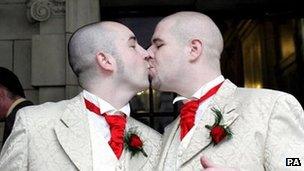Church of England urged to offer same-sex blessings
- Published

The report does not recommend marriage ceremonies for gay couples
Members of the clergy should be allowed to offer blessings to same-sex couples, a report commissioned by the Church of England has recommended.
The report, produced by four bishops and chaired by former civil servant Sir Joseph Pilling, does not propose offering a "formal liturgy".
But it says priests should be "free" to give gay couples a "public service".
The Church pointed out the report is for discussion and is "not a new policy statement from the Church of England".
The report says the Church must find "ways of honouring" gay Christians who "conscious of the Church's teaching, have embraced a chaste and single lifestyle, and also those who in good conscience have entered partnerships with a firm intention of life-long fidelity".
'Deeply entrenched views'
It says clergy should, with the agreement of their local church council, "be free to mark the formation of a permanent same-sex relationship in a public service but should be under no obligation to do so".
"Some of us do not believe that this can be extended to same-sex marriage," it adds.
The report suggests a consultation should be carried out "without undue haste but with a sense of urgency, perhaps over a period of two years".
It recognises there are "deeply entrenched views" on sexuality within the Church of England which "would best be addressed by facilitated conversations".
Its recommendations include:
No-one should be accused of homophobia solely for articulating traditional Christian teaching on same-sex relationships
The Church should continue to pay close attention to the continuing, and as yet inconclusive, scientific work on same-sex attraction
The whole Church is called to real repentance for the lack of welcome and acceptance extended to homosexual people in the past, and to demonstrate the unconditional acceptance and love of God in Christ for all people
The bishops of Gloucester, Birkenhead, Fulham and Warwick worked on the report, but the Bishop of Birkenhead refused to sign the completed document.
In a "dissenting statement" included in the report, he said he supported many of its recommendations and the others involved had "gone out of their way to listen to my views".
But he said he was "not persuaded that the biblical witness on same sex sexual behaviour is unclear".
"I believe the trajectory in the report will undermine the discipleship and pastoral care of many faithful Christians and, by leading the Church into the kind of cultural captivity which much of the prophetic writings warn against, weaken our commitment to God's mission," he added.
The report was commissioned by the Church of England's House of Bishops, which is made up of 52 bishops and is one of the three houses of the General Synod.
'Immoral behaviour'
The Church Society, which exists to "promote a biblical faith", said it welcomed the report because it provided an opportunity for open discussion by the whole Church.
Its director Lee Gatiss said the group would rather "discuss the good news of Jesus Christ", but felt "constrained to respond to the teaching of those who are changing the gospel into an affirmation of immoral behaviour".
Inclusive Church, which wants the Church to be "welcoming and open to all", said the report was a "a reflection of careful listening to many voices in church and state".
The Very Reverend Dianna Gwilliams, Dean of Guildford Cathedral and chair of Inclusive Church, said: "We also look forward to the House of Bishops response and the guidance which will be issued to churches.
"We hope that this will enable all Christians to find ways of celebrating the covenantal love between people which reflects the love of God for all people."
'Legal lock'
A law permitting same-sex marriage in England and Wales received Royal Assent in July and the first marriages are expected next year.
Religious groups can "opt in" to offer gay marriages, but the Church of England and the Church in Wales are banned from doing so.
Both churches stated their opposition to carrying out same-sex marriages, and Culture Secretary Maria Miller said the ban was used as part of a "legal lock" to prevent them from being "forced" to do so.
Earlier this month legislation to introduce same-sex marriage in Scotland was backed in principle by the Scottish Parliament, though the Church of Scotland and Catholic Church remain opposed to it.
The Northern Ireland Assembly is not currently considering any legislation to allow same-sex marriage.
- Published30 October 2013
- Published6 July 2013
- Published4 June 2013
- Published11 December 2012